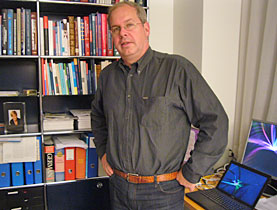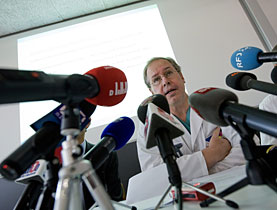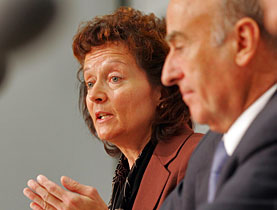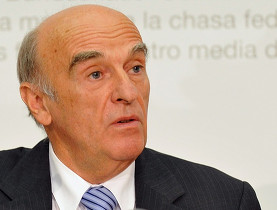Listening to the heartbeat of top doctor

Switzerland's leading heart surgeon was in the spotlight last month when he performed a successful quintuple bypass operation on Finance Minister Hans-Rudolf Merz.
Thierry Carrel, head of Bern University’s heart clinic, gives swissinfo his definition of responsibility, stress and professional discretion.
The surgeon advised Merz to take it easy after the operation but the 65-year-old minister has already announced that he will resume work on Monday, and that he intends as planned to take on the additional role of the rotating Swiss presidency in 2009.
swissinfo: Is Hans-Rudolf Merz acting responsibly?
Thierry Carrel: I assume that he feels better but I unfortunately haven’t had any contact with him since he was released from hospital. It seems top managers recover and return to work faster than other people. Finance Minister Merz must decide for himself whether that is the sensible thing to do.
swissinfo: You yourself work up to 100 hours a week. That is not healthy. Shouldn’t a doctor know better?
T.C.: The question is whether the overtime means more stress or is simply a lot of work with fewer opportunities to relax. I don’t consider it stressful but actually look forward to when I must spend a lot of time in the operating room.
But I am affected by stress when I have a lot of appointments close to each other or even simultaneously and cannot delegate responsibility because I don’t have enough staff.
swissinfo: How do you deal with these kind of situations?
T.C.: I take advantage of the small windows of time I have at my disposal in my well-organised day.
Once or twice a week I work out for an hour at the gym of the university hospital. Sometimes I walk home instead of taking the bus to keep fit.
Everything I do I do with more intensity than I used to. I’ve developed this philosophy of life over the years.
swissinfo: How do you prepare for an operation?
T.C.: Each patient has the right to expect that I am giving them my full attention. If I’m unexpectedly called to the operating room I take the time, even if it’s only a couple of minutes, to prepare for what’s at hand.
swissinfo: How do you reconcile the high burden your work places on you with your private life?
T.C.: A family needs to have a lot of understanding for someone with such management responsibility. It’s not easy for children to understand. I’ve learned that small activities like cooking and dining together are very important. I help my daughter with her homework and therefore she can stay up longer in the evening. You can do a lot but it’s a tight schedule.
swissinfo: The media was on the scene when Merz was flown to the hospital in Bern last month. How close do you think journalists should be allowed to come in these kinds of situations and when is it considered an invasion of a patient’s privacy?
T.C.: That’s a touchy subject since there are no norms. In Merz’s case, we respected the wishes of his family, the recommendations of the federal authorities as well as the head of communications of the hospital.
Many people are informed when a drama unfolds, such as when a government minister is being transferred from one hospital to another.
We are subject to the rules of professional discretion but not everything can be foreseen. The media has its own dynamics and is prone to speculation until something is said for the record.
All hell broke loose after the operation when we said we would wait 48 hours before providing any details. Journalists combed through the hospital looking for any possible sources of information.
swissinfo: You don’t only perform surgery on prominent individuals. Do you see many patients for the first time in the operating room?
T.C.: I meet the patient beforehand to explain the procedure. I value getting to know the people I operate on. That’s time intensive and is not always possible to the same degree.
swissinfo: How do you feel when you save someone’s life with a heart transplant?
T.C.: Whether you perform a conventional heart operation or put a foreign heart in an empty chest cavity is medically very risky from a purely scientific point of view.
Over time, one learns to deal with the responsibility, which I live with night and day. Even when I’m on holiday I’m still responsible for the clinic.
swissinfo: You are often confronted with death. How do you cope when a patient dies?
T.C.: That’s a heavy burden especially for young surgeons. It’s much more difficult to accept the death of a small child than a very old person who has had a long life.
swissinfo: Your plans to move to Zurich a few years ago to take over the heart surgery clinic at the university there failed. Since then, there has been a rivalry between Bern and Zurich.
T.C.: We have the luxury in Switzerland to perform 5,000 operations a year at 18 different clinics. Bern has both a public and a private clinic for heart surgery and they have good relations with each other.
There are two public and two private institutions for a similar number of operations in Zurich. When you compare the populations of the two cities, the Zurich clinics only perform half as many operations as in Bern and that’s probably one reason why there’s a lot of discussion. In high-end medicine it’s a question of how many operations are performed in which centre.
swissinfo-interview: Susanne Schanda
Heart surgery is performed in 18 different clinics in Switzerland, including five university clinics in Basel, Bern, Geneva, Lausanne and Zurich.
The university clinics of Bern and Basel work together, with heart transplant operations carried out in Bern. The university clinics of Geneva and Lausanne have a similar arrangement.
Canton Zurich has two public and two private heart centres.
Thierry Carrel was born in 1960 in Freiburg. He studied medicine in Fribourg and Bern.
He spent a number of years training in Switzerland and abroad to become a specialist for general surgery as well as for heart and vascular surgery.
Carrel was promoted to professor at Zurich University in 1993 and eventually received a teaching assignment from Bern University.
He became a full professor in 1998 and was named director of the heart and vascular surgery clinic at Bern university hospital.

In compliance with the JTI standards
More: SWI swissinfo.ch certified by the Journalism Trust Initiative



You can find an overview of ongoing debates with our journalists here . Please join us!
If you want to start a conversation about a topic raised in this article or want to report factual errors, email us at english@swissinfo.ch.